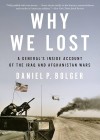Why We Lost: A General’s Inside Account of the Iraq and Afghanistan Wars
Written by: Daniel P. Bolger,
Houghton Mifflin Harcourt, 2014,
ISBN 9780544370487, 544pp,
Reviewed by: Brigadier Simon Stuart
Recently retired US Lieutenant General Dan Bolger’s provocatively titled book Why We Lost: A General’s Inside Account of the Iraq and Afghanistan Wars ultimately fails to prove its thesis. But, it does not matter. Counterintuitively, the value of Bolger’s book does not rely upon congruence between its title and the argument that ensues. Dealing primarily with the US response to al Qaeda’s series of provoking attacks that culminated in the events of the 11 September 2001, Why We Lost chronicles the wars in Iraq and Afghanistan, declares strategic failure, and lays the blame at the feet of the Generals. Whether a ‘disruptive thinker’ or merely giving voice to the thoughts of others, Bolger starts the difficult conversation that America needs to have, but his themes should resonate with international audiences.
Often described as a ‘soldier–scholar’, a value-laden term against which he measures up well, Bolger has authored eight, mainly historical, military books. He earned a doctorate in history from the University of Chicago and taught the same at West Point. He currently teaches at the North Carolina State University. Combined with his thirty-five year career in the US Army, including experience as a General Officer in both Iraq and Afghanistan, Bolger has a multifaceted grasp of his subject matter.
Why We Lost is arranged, quite deliberately, as a Greek tragedy. Between the strategically pitched prologue and the epilogue are the book’s three episodes: Triumph, Hubris and Nemesis. In ‘Triumph’ he deals with the initial successes in Afghanistan and Iraq and concludes with President G.W. Bush’s ‘Mission Accomplished’ speech. ‘Hubris’ and ‘Nemesis’ aptly describe the wars in Iraq and Afghanistan, respectively. Equal treatment is given to each episode and, in contrast to the strategic bookends, they are rich in tactical detail. Bolger the thoughtful historian is present throughout the book. He draws on the likes of Thucydides and Clausewitz in the strategic analysis and many chapters present an historical tactical analogy. At the same time Bolger delivers a masterclass on the contemporary application of the theory of war and strategy, reignites the debate on the utility of force in the twenty-first century, argues the need for greater transparency in civilian–military relations, and provides compelling evidence of why students of the profession of arms ought to study history.
Why We Lost’s crosscutting themes are woven into the chronology of the ‘Global War on Terror’. They have broad application and will be familiar to military professionals and policymakers of most nations. The themes also afford access to the internal debate of Australia’s most significant ally and provide a basis for similar introspection on Australian policy and strategy in Iraq and Afghanistan. Some important questions emerge, including on how Australia should weight its contribution to America’s wars to best protect and promote Australia’s interests, when and how to fulfil an ally’s responsibility to speak frankly, and how to express limitations borne of fundamental differences in strategy, assessment and national interest.
While his style is engaging, digestible and underscored by a palpable conviction, a sense of urgency, and more than a hint of exasperation, Bolger’s argument is contradictory and at times confusing. Nowhere in the book is the central thesis satisfactorily proven. There are contrary references; for example he states, ‘many Generals, including some at the very top …shared their views…with civilian leaders’. After blaming the generals, himself included, for poor strategy in the Global War Against Terror he concludes that ‘the [US presidential] administration backed into two lengthy, indecisive counterinsurgency campaigns’. It is generally accepted that, in the formulation of national strategy, generals provide advice and the political leadership make the decisions about national purpose and interests, and commission the means to achieve them. Some generals were clearly ‘speaking up’, but the realities of the political environment and the role that senior military leaders played in this complex tragedy is not dealt with in the necessary depth to convincingly make his point.
The other stark contradiction with the title’s pronouncement lies in the book’s ultimate paragraph. Using South Korea as an historical example, Bolger concludes that ‘one of the features of such conflicts involves their indeterminate outcomes. It takes decades to be sure’. With US and coalition troops still on the ground in both Iraq and Afghanistan, and the inevitable run of successes and failures that accompany self-determination, it may be premature to diagnose failure.
Arguably, Bolger’s main criticism of generalship during this tumultuous period is the failure at effective operational art; that is, the imposition of an organising logic that gives purpose and coherence to tactical actions, linking them to achieve the strategic ends and, most importantly, to the interests inherent in foreign policy. Alas, due to the overuse of inference in the book, this point is lost on all but a small audience of practitioners. The tactical-level vignettes and their historical accompaniments are difficult to link with the book’s thesis. These are nevertheless extremely well executed and serve the higher purpose of providing US citizenry and their allies with a more textured insight into the competence and commitment of soldiers, the realities of war and their impact on the people who fight them. In an era where Australia’s wars have little, if any, impact on the lives of the majority of its citizens, this is a worthy subject.
Whether or not one agrees with Bolger’s point of view is largely irrelevant to the substance and value of Why We Lost. The book leaves the reader variously uncomfortable, angry, sad and with a sense that something is not quite right. If judging Bolger’s purpose correctly, this is precisely what he set out to elicit: a feeling in the gut or a persistent thought in the minds of those who commanded, those who fought this war and those who will fight the next, that the political class will wear the heavy burden of their decisions among the citizenry in whose name this is done. Similar in approach to Australian Major General Jim Molan’s 2008 book, Running The War In Iraq, Why We Lost derives its value from its divergent perspective. Bolger’s book is a timely addition to the growing list of contemporary accounts of war written by insiders. These build on the substantial number of volumes dealing with similar subject matter in relation to the Vietnam War that have been studied for a generation in Australia’s military training and education institutions.
Why We Lost is an intelligently crafted book that connects with all its intended audiences at different levels – no small feat. The gravity of the subject matter, Bolger’s visceral articulation of the cost of war and his personal conviction and integrity are a compelling combination.


